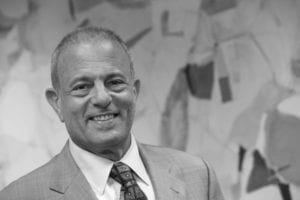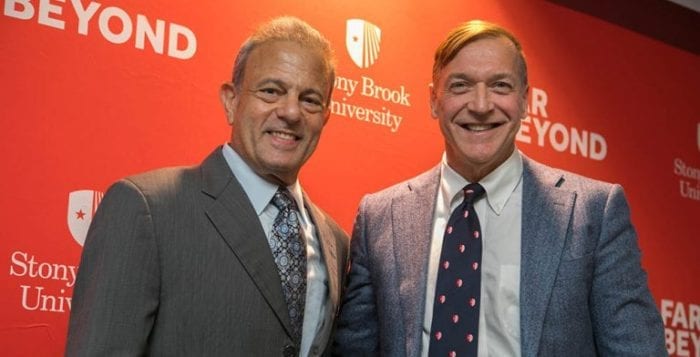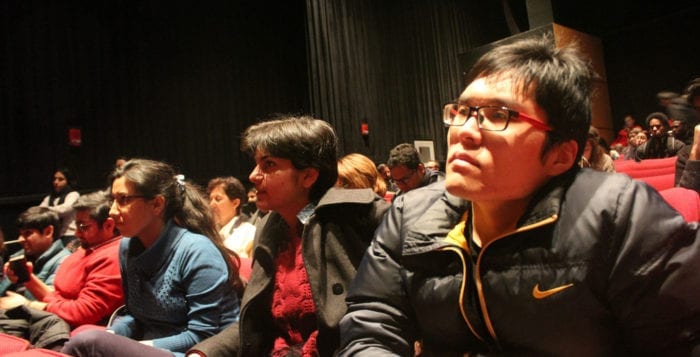Michael Bernstein, the new interim president of Stony Brook University, came by TBR News Media’s office for an exclusive interview where he spoke on his new role, challenges the school faces and his thoughts on the future. Here is what he had to say.
Is there any chance you will stay in this role permanently?
This past January, I talked through with [previous SBU President Dr. Samuel L. Stanley Jr.] about concluding my tenure as provost [at the university].
My partner Patty and I have made plans to go to San Diego, where we’ve had a home for 20-plus years. It’s been a prime directive to get back to San Diego.

Things changed, when Sam announced he would be leaving, and he asked if I’d be willing to serve in the interim [president] role if the chancellor of SUNY, Kristina Johnson, asked me to do so.
I remember at that meeting, I was like, “I need to talk to Patty and then I’ll talk to you again.”
Patty and I talked it through and here we are. I am delighted to be in this role. As for the longer-term future, we have open minds and will take it one day at a time.
Let’s see if I like the job and more importantly let’s see if the job likes me and we’ll go from there.
So you don’t see yourself as a placeholder?
No, I am the interim president. My goal, my hope and my intention is to do the job — that’s what the chancellor expects from me and I think that’s what all our colleagues on campus expect of me. I’m going to do my best.
It’s true when you are serving in an interim role, you have to balance the reality of the role with the tasks that have to be done.
There are some things an interim president might not be able to do. Some lifts might be too heavy. I’m here to serve the campus the best I can.
What do you see as your biggest challenges?
Challenges are also opportunities. We want to maintain the trajectory that Sam established in his decade-long tenure [as president].
Our student success metrics have been improving in the past 10 years. Graduation rates have gone up and we want to keep that momentum.
Right now, our six-year rate is at the high mid-60th percentile. Roughly 62, 63 percent of our students have their degrees in hand within six years of their initial matriculation. The goal is to get that number up into the 70th percentile and that’s doable. It will take work, resources and determination.
The quality of our students keeps going up. We are doing a much better job in advising, tutoring, counseling and making sure they have a clear path to graduation.
There’s still this general anxiety over whether or not the school focuses more on STEM than the humanities and arts. What do you think should be done in those terms?
I’m certainly aware of the sentiments. We do have outstanding departments and units in STEM base fields. That’s been true probably since the day the school opened.
It is not something we would ever ignore or look past. I actually feel the sense that we are overlooking the arts and humanities is sometimes misconstrued. We have some excellent programs — political science is a nationally ranked program, our Hispanic language and literature program is one of the best in the field, our music department competes with Julliard for MFA [master of fine arts] students.
I’ve just used those programs as an example … could we strengthen other units? Of course, when we have the ability to do so, but that’s in the sciences too.
Is there a chance the theatre arts major will come back?
Sure, there is a chance. There are no plans on the table today. The decision to deactivate the theatre arts major was a tough one made under stressful budgetary circumstances.
It is always a relative judgment — do you do this before you do that. I know it is a tough conversation to have with colleagues, especially if they are in the area where you said, “No, we are not going to invest here.”
“We are simply not the kind of university of size and resources where we can do everything at once.”
— Michael Bernstein
We are simply not the kind of university of size and resources where we can do everything at once.
We have to make some tough choices. I always say to people, “The word’s not ‘never,’ the word is ‘not right now,’ and we’ll have to see what the future brings.
Is there a way to bridge the gap with commuters and residents so they both feel like they are a part of the campus?
At the moment, we can’t envision a future where we have 100 percent residency for our undergraduates. It just doesn’t seem practical in terms of the site, the amenities and infrastructure.
Also, I don’t think it is something the student community wants. We have a significant community of students who prefer to be commuters for any number of reasons. We want to make sure we are delivering an outstanding experience for both the resident and commuter students.
That’s challenging. We do have a student affairs team that is looking at the issue of commuter students. Thinking of ways of making the experience better.
Title IX [regarding sexual harassment, discrimination in education law]?
I think SUNY as a whole and here at the Stony Brook campus is resolutely committed to robust Title IX processes and procedures. We have good leadership at the Title IX office. We are constantly trying to make sure we are doing the best we possibly can. How can procedures be improved.
One of our biggest concerns is that the information about Title IX processes and procedures is disseminated effectively, so that everyone at the university community is aware.
I’m determined ongoing in this role to supply as much support as possible to them and let them know I have my hand on their back; making sure the campus is safe, secure and welcoming to all constituents is job No. 1.
Rumors of the possibility of more shops on campus?
We’ve always been involved in thinking through opportunities for potential partnerships or ways to improve amenities and capacity on campus.
I have no concrete contract to pull out and say we are doing this. We are exploring things all the time. We know we have to build more dorm capacity, which means we have to bring more amenities to campus.
If we can find partnership to do that, like we did with the hotel, we would explore that. Why wouldn’t we? I don’t know if it will happen but it is something worth exploring.
What is the status of the new MART (Medical and Research Translation) building/Children’s Hospital?
We have been frustrated by delays, but I’m told the latest is end of October for the MART and the beginning of November for the Children’s Hospital.
Has the problem been in the heating, ventilation and air conditioning system or foundation?
In response to this question, Nicholas Scibetta, vice president for marketing and communications, stepped in:
Not foundation. It’s more quality checks and things like that. It’s been our drive on our side -— the Stony Brook side — to make sure that everything is exactly where it needs to be.






